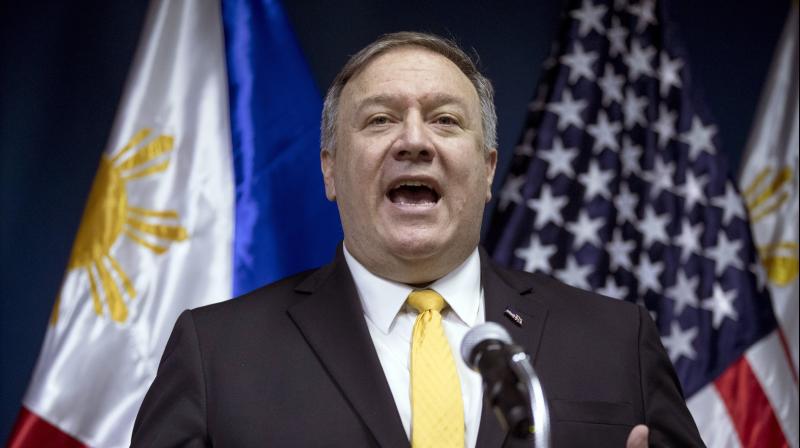Pompeo\'s visit to India aims at deepening strategic relationship: US

Washington: Secretary of State Mike Pompeo's visit to India is aimed at deepening strategic relationship with the largest democratic country of the world, the US said Tuesday.
Noting that the United States and India are natural strategic partners, a State Department Fact Sheet said that President Donald Trump and Prime Minister Narendra Modi are firmly committed to accelerating the upward trajectory of this partnership.
"Prime Minister Modi's sweeping mandate in the recent elections creates a unique opportunity to realize this vision," it said hours after Pompeo landed in New Delhi on a three-day visit. The United States and India are moving quickly to achieve their shared vision for a free, open, and rules-based Indo-Pacific region by expanding cooperation in areas such as energy, aviation, and space, it added.
Pompeo's visit marks the third visit to India by a Secretary of State during the Trump Administration. After his India visit from June 25-27, Pompeo will travel to Japan to attend the G-20 Summit with Trump.
Modi would also be attending the summit of leaders from top 20 economies of the world. The two leaders are scheduled to meet on the sidelines of the summit. Trump and Modi would be joined by Japanese Prime Minister Shinzo Abe for their second trilateral summit.
"We have elevated the level of strategic interaction between our two countries, most notably through the annual 2+2 Ministerial Dialogue that pairs the Secretaries of State and Defense with their Indian counterparts," the State Department said. The first 2+2 was held in September 2018 and culminated in the announcement of a new tri-service exercise and the signing of a secure communications agreement that will enable India to operationalise its status as a Major Defence Partner.
The next 2+2 is likely to be held in Washington later this year. The United States granted India Strategic Trade Authorization tier 1 status last year, allowing India to enjoy the same license-free access to certain defense articles as NATO allies Japan, South Korea, and Australia. This status also creates greater supply chain efficiency and supports US industry and investment, it said.
"The reinvigorated quadrilateral dialogue between the United States, India, Japan, and Australia has met four times since President Trump took office to discuss ways to strengthen a rules-based order in the Indo-Pacific in which all nations are sovereign, strong, and prosperous," the State Department said. Asserting that the support for US-India ties transcends political parties and presidential administrations, the State Department said as the world's oldest and largest democracies, the United States and India share deep respect for one another's values and traditions.
"Our people and cultures are profoundly intertwined," it said. "The Indian diaspora in the United States is nearly 4 million strong. Indian-Americans are thriving in the United States and helping to make our communities more secure and prosperous through their leadership in industry, academia, and government,” the State Department said. Indian students enrich US campuses, contribute to its economy, and build lifelong bonds with Americans.
The number of Indian students studying in the United States has increased for the fifth year in a row, more than doubling from 96,000 students in the 2012-13 academic year to 1,96,000 in 2018. "In 2018, Indians received 70 per cent of H-1B visas issued worldwide. The program allows talented Indian professionals to participate in the US economy and return to their country with new skills to contribute to India's economic growth, to our mutual benefit," the State Department said.

